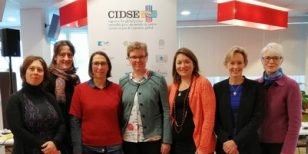
We are seeing changes in many spheres, with women finally reaching the top positions of more and more structures and organisations, but still we notice, because it is not yet the norm, and we know that the road was surely full of challenges or there would be many more. At CIDSE, the face of our leadership has changed in just a few years. Perhaps this is even more remarkable because, as a Catholic development and social justice network, women are traditionally present from the grassroots all the way through the very fibre of our organisations, but rarely are they the leaders. Despite their experience, their knowledge, their years of invaluable contribution to development work and to their service to the Church, many women are still overlooked, undervalued, or underestimated.
These are the stories of several women leaders within our network, who share their thoughts on this road they have travelled, the challenges they faced, the doubt that many have experienced, but also the advice, support, guidance, and inspiration they drew from others along the way.
There are different kinds of blocks and pressures that we all face. Some are cultural, social, economic, or political. Some are institutional, and still others are personal, internalised limits that we put on ourselves. We also often doubt our own capacities because of the messages we have heard throughout our education and experience, and the models of leadership that we were presented with. We didn’t always recognise ourselves in the examples we saw and struggled to imagine ourselves in these roles even if we wanted to lead, even if somehow, we knew we could.
And organisations such as those that make up CIDSE, working closely within or with the structures of the Catholic Church perhaps face the double challenge of being traditionally led by clergy and men. Greater diversity is always enriching and can change the culture of an organisation in a very positive way. We know that new qualities are being sought in leaders if we want to face the social, political and environmental challenges of today’s world: compassion, emotional intelligence, cultural awareness, balance, imagination, integrity. These are all things that women can bring to the table just as well as men – if not better at times. So, what is it that still prevents some women from leading? Each experience is different but we can learn from them all.
We share these stories to honour the courage and determination, as well as the humility of the women who generously opened their hearts and minds to us, but we also want to start up a discussion with the next generation of women and men leaders, to help create a more open, diverse, and inclusive environment where we recognise the contributions and qualities of those around us and lift them up. We are proud of what we are accomplishing together, and we hope that a new path has been drawn, with old stereotypes of what a leader looks and acts like falling away, to be replaced by the faces of people who inspire us to do better and live to the fullest of our gifts.
To make it easier to spread these messages, we have created this VIDEO “Gender Equality in CIDSE Leadership” with an inspirational call from CIDSE’s Women Directors to other women to assume leadership roles. Their call does not need to target necessarily women working in faith organisations, but more broadly women whose environment presents different types of obstacles to get to leadership.
With the testimonies of:
– Josianne Gauthier, CIDSE
– Susana Refega, FEC (Portugal)
– Lieve Herijgers, Broederlijk Delen (Belgium)
– Susan Gunn, Maryknoll Office for Global Concerns (USA)
– Christine Allen, CAFOD (England and Wales)
– Axelle Fischer, Entraide et Fraternité (Belgium)
– Caoimhe de Barra, Trócaire (Ireland)
